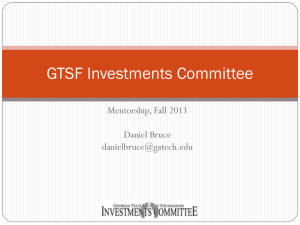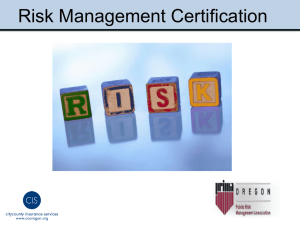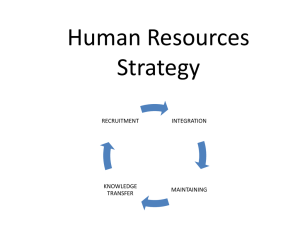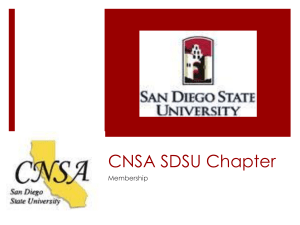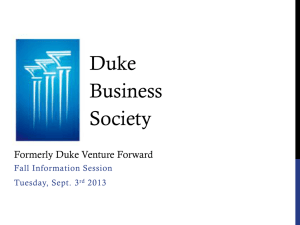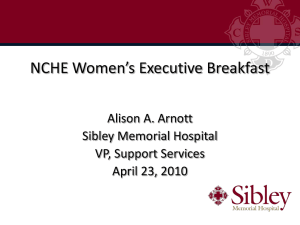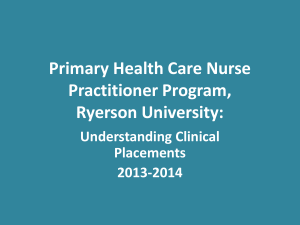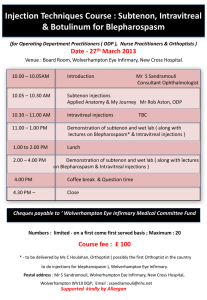Mentorship at SHU - Sheffield Hallam University
advertisement
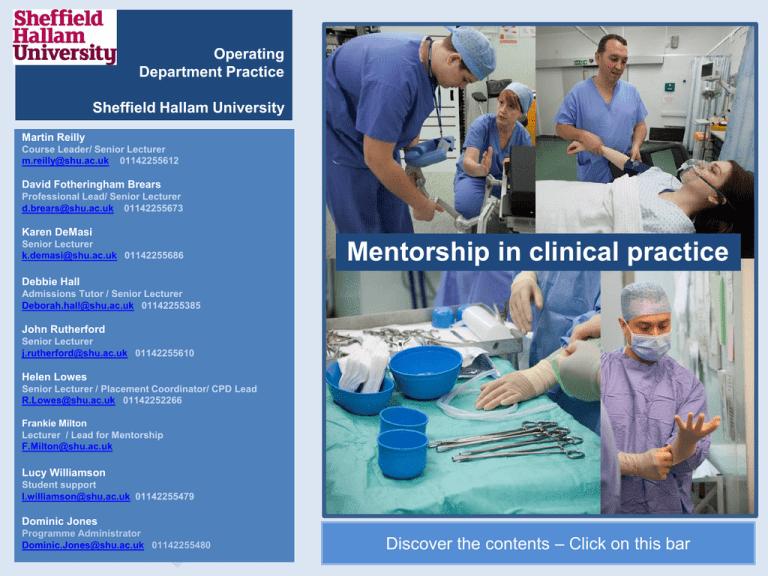
Operating Department Practice Sheffield Hallam University Martin Reilly Course Leader/ Senior Lecturer m.reilly@shu.ac.uk 01142255612 David Fotheringham Brears Professional Lead/ Senior Lecturer d.brears@shu.ac.uk 01142255673 Karen DeMasi Senior Lecturer k.demasi@shu.ac.uk 01142255686 Mentorship in clinical practice Debbie Hall Admissions Tutor / Senior Lecturer Deborah.hall@shu.ac.uk 01142255385 John Rutherford Senior Lecturer j.rutherford@shu.ac.uk 01142255610 Helen Lowes Senior Lecturer / Placement Coordinator/ CPD Lead R.Lowes@shu.ac.uk 01142252266 Frankie Milton Lecturer / Lead for Mentorship F.Milton@shu.ac.uk Lucy Williamson Student support l.williamson@shu.ac.uk 01142255479 Dominic Jones Programme Administrator Dominic.Jones@shu.ac.uk 01142255480 Discover the contents – Click on this bar Mentorship at SHU • What is a mentor? • Mentorship at SHU • The ODP Calendar • Programme Overview • Times of stress • How to alleviate stress • Student Learning • The Learning Environment • Learning agreements • Competencies • End of year assessments • The failing student • Placement Website Mentorship at SHU • What is a mentor? • Mentorship at SHU • The ODP Calendar • Programme Overview • Times of stress • How to alleviate stress • Student Learning • The Learning Environment • Learning agreements • Competencies • End of year assessments • The failing student • Placement Website CODP (2009) Standards, recommendations and guidance for mentors and practice placements, London, © College of Operating Department Practitioners, pg 12 Mentorship at SHU • What is a mentor? • Mentorship at SHU • The ODP Calendar • Programme Overview • Times of stress • How to alleviate stress • Student Learning • The Learning Environment • Learning agreements • Competencies • End of year assessments • The failing student • Placement Website Mentorship at SHU • What is a mentor? • Mentorship at SHU • The ODP Calendar • Programme Overview • Times of stress • How to alleviate stress • Student Learning • The Learning Environment • Learning agreements • Competencies • End of year assessments • The failing student • Placement Website Mentorship at SHU • What is a mentor? • Mentorship at SHU • The ODP Calendar • Programme Overview • Times of stress • How to alleviate stress • Student Learning • The Learning Environment • Learning agreements • Competencies • End of year assessments • The failing student • Placement Website I know I am a qualified mentor but what can I sign? Mentors Have to be Level 6 (degree level) qualified (or equivalent) mentors. You can sign all aspects of the ODP paperwork progression statement at the end of the gateways. You can do end of year assessments. You should be part of planning the placements for students and completing the learning agreements and mid term reviews. If you complete the end of the gateway progression statement with the student you must sign all progression boxes ( at the bottom of each competency) as the second, or counter signature and by doing so you are declaring that the student has gained signatures for all competencies and is competent for the completion of the gateway. The ODP course team requires that you maintain your mentorship qualification by attending regular (annual) updates. These should be available in your department, but requests can be made to your visiting lecturer to come and deliver an update. Alternatively you may wish to attend a nursing mentor update as this will cover key aspects of mentorship, however the specifics of the ODP paperwork may not be considered. Mentorship at SHU • What is a mentor? • Mentorship at SHU • The ODP Calendar • Programme Overview • Times of stress • How to alleviate stress • Student Learning • The Learning Environment • Learning agreements • Competencies • End of year assessments • The failing student • Placement Website I know I am an associate mentor but what can I sign? Associate Mentors Non level 6 qualified practitioners. You can sign, date and make comments on, or write a testimony in the main boxes on each competency within the ODP paperwork, however, the progression statement at the bottom must be countersigned by a qualified mentor. You cannot complete the progression boxes at the bottom of each competency or complete the progression statement at the end of the gateways and should not complete the learning agreement unless countersigned by a qualified mentor. You cannot do end of year assessments. The ODP course team requires that you maintain your associate mentorship status by attending regular (annual) updates. These should be available in your department, but requests can be made to your visiting lecturer to come and update a number of mentors together, or you may wish to attend a nursing mentor update as this will cover key aspects of mentorship (however perhaps not the specifics of the ODP paperwork). The SHU teaching Team Mentorship at SHU • What is a mentor? • Mentorship at SHU • The ODP Calendar • Programme Overview • Times of stress • How to alleviate stress • Student Learning • The Learning Environment • Learning agreements • Competencies • End of year assessments • The failing student • Placement Website David Fotheringham Brears, Professional Lead, Principal Lecturer Debbie Hall, Martin Reilly, Recruitment Lead, Senior Team Lead, Course Lecturer Leader, Senior Lecturer 0114 225 5835 0114 225 5673 deborah.hall@shu.ac.uk d.brears@shu.ac.uk Visiting Lecturer - Lincoln Visiting lecturer - Mansfield John Rutherford, Senior Lecturer 0114 225 5612 M.Reilly@shu.ac.uk Visiting Lecturer Doncaster & Bassetlaw Karen Demasi, Helen Lowes, Assessment Lead, Senior Placement Lead, Senior Lecturer Lecturer 0114 225 5610 0114 225 5686 j.rutherford@shu.ac.uk K.demasi@shu.ac.uk Visiting Lecturer - Sheffield Visiting Lecturer Rotherham 0114 225 2266 R.Lowes@shu.ac.uk Visiting Lecturer - Derby and Derby Nuffield Frankie Milton Lecturer, Mentorship lead 0114 225 2266 F.Millton@shu.ac.uk Visiting Lecturer - Rotation (Claremont, Sheffield Children's, Thornbury, Barnsley) Mentorship at SHU • What is a mentor? • Mentorship at SHU • The ODP Calendar • Programme Overview • Times of stress • How to alleviate stress • Student Learning • The Learning Environment • Learning agreements • Competencies • End of year assessments • The failing student • Placement Website Mentorship at SHU • What is a mentor? • Mentorship at SHU • The ODP Calendar • Programme Overview • Times of stress • How to alleviate stress • Student Learning • The Learning Environment • Learning agreements • Competencies • End of year assessments • The failing student • Placement Website Note - There are major changes for 2014 2015- please contact one of the team to discuss. YEAR ONE ASSESSMENT GUIDE (Always check with Module leaders to ensure information is correct and up to date) Date Module Assessment Feedback In Module Retrieval IMR Module Leader 11/11/2013 UKESSP Coursework 2nd December 2013 24th Jan 2014 John Rutherford Wednesday 27/11/2013 Human Biology Coursework 18th Dec 2013 17th Jan 2014 Helen Lowes Tuesday 03/12/2013 IT Coursework 24th Dec 2013 7th Jan 2014 Debbie Hall Friday 19/12/2013 IIP Coursework 20th Jan 2014 N/A Geraint Owen Tuesday 14/01/2014 ODP Foundations 4th Feb 2014 18th Feb 2014 Frankie Milton Friday 17/02/2014or 18/02/2014 ODP Foundations Gateway 1 Electronic Submission 11th March2014 N/A Frankie Milton Thursday 14/03/2014 Human Biology Short Answer Phase Test 4th April 2014 3rd June 2014 Helen Lowes Thursday 27/03/2014 Anaesthetic Practice Coursework 17th April 2014 25th June 2014 Karen DeMasi Friday 11/04/2014 Surgical Practice 1 2nd May 2014 1st Aug 2014 Debbie Hall Friday 09/05/2014 AP & SP1 Gateway Electronic Submission 30th May 2014 N/A Karen DeMasi/Debbie Hall Friday 20/06/2014 AP & SP1 Gateway Electronic Submission 11th July 2014 N/A Karen DeMasi/Debbie Hall Friday 01/08/2014 AP & SP1 Gateway Electronic 22nd Aug 2014 27th Aug Provisional feedback will be received 3 weeks from the2014 submission date Submission Coursework Coursework Karen DeMasi/Debbie Hall (Please note provisional means the marks have not been ratified by the board and are still subject to change following external moderation) YEAR TWO ASSESSMENT GUIDE (Always check with Module leaders to ensure information is correct and up to date) Date Module Assessment Feedback In module Retrieval IMR Module Leader Gateway Electronic Submission 22nd November 2013 N/A Martin Reilly/ John Rutherford Friday 01/11/2013 AREC & SP2 Thursday 21/11/2013 Advanced Human Biology Coursework 12th December 2013 23rd Jan 2014 Helen Lowes Thursday 19/12/2013 Advanced Human Biology Short Answer Phase Test 17th January 2014 N/A Helen Lowes Friday 24/01/2014 AREC & SP2 Gateway Electronic Submission 14th February 2014 N/A Martin Reilly/ John Rutherford Friday 21/02/2014 AREC Poster & Supporting Paper 14th March 2014 1st Aug 2014 Martin Reilly Friday 07/03/2014 Prep for Professional Practice Authentic World 7th March 2014 10th April 2014 Karen DeMasi 10/03/2014 – 21/03/2014 Surgical Practice 2 Presentation (1st Years to Observe) + Annotated Bibliography 10th – 21st March 2014 28th May -6th June 2014 John Rutherford Monday 14/04/2014 UEEIP Coursework 12th May 2014 N/A Clare De Normanville Tuesday 29/04/2014 DCP Coursework 20th May 2014 N/A Friday 09/05/2014 AREC & SP2 Gateway Electronic Submission 30th May 2014 N/A Martin Reilly/ John Rutherford Wednesday 21/05/2014 Prep for Professional Practice Skeleton Portfolio for CPD 11th June 2014 N/A Karen DeMasi Friday 20/06/2014 AREC & SP2 Gateway Electronic Submission 11th July 2014 N/A Martin Reilly/ John Rutherford Friday 01/08/2014 AREC & SP2 Gateway Electronic Submission 22nd Aug 2014 27th Aug 2014 Martin Reilly/ John Rutherford Provisional Feedback will be received 3 weeks from the submission date. (Please note provisional means the marks have not been ratified by the board and are still subject to change following external moderation) Mentorship at SHU • What is a mentor? • Mentorship at SHU • The ODP Calendar • Programme Overview • Times of stress • How to alleviate stress • Student Learning • The Learning Environment • Learning agreements • End of year assessments • The failing student • Placement Website Student Learning - Timesheets & Reflections Students complete 34hours in clinical practice per week and are given 3.5 hours per week to write a 2000 word reflection per gateway Mentorship at SHU • What is a mentor? • Mentorship at SHU • The ODP Calendar • Programme Overview • Times of stress • How to alleviate stress • Student Learning • The Learning Environment • Learning agreements • Competencies • End of year assessments • The failing student • Placement Website From 2012 onwards Sheffield Hallam university ODP Clinical Skills Passport CLINICAL COMPETENCIES GATEWAYS A number of competencies are required to be completed by the end of the level 4 and level 5. The competencies map the curriculum for the DipHE in ODP and are associated with the learning outcomes and assessments for the ODP modules. Submission is via PEBBLEPAD. Mentorship at SHU • What is a mentor? • Mentorship at SHU • The ODP Calendar • Programme Overview • Times of stress • How to alleviate stress • Student Learning • The Learning Environment • Learning agreements • Competencies • End of year assessments • The failing student • Placement Website Year 1 Year 2 Year 2- further detail Gateway 1 Foundations Gateway 5 Anaesthetics & Surgery Gateway 6 Anaesthetics & Surgery (Formal Assessment) Gateway 2 Anaesthetics & Surgery Gateway 3 Anaesthetics & Surgery Gateway 7 Anaesthetics & Surgery (Assessments) Gateway 4 Anaesthetics & Surgery Gateway 8 Recovery (Assessment) Gateway 9 Emergencies & Obstetrics Must be in order in first year. Any order in 2nd year. LEARNING AGREEMENT FOR GATEWAY1 (GENERIC- FOR ALL STUDENTS ) Mentorship at SHU • What is a mentor? • Mentorship at SHU • The ODP Calendar • Programme Overview • Times of stress • How to alleviate stress • Student Learning • The Learning Environment • Learning agreements • End of year assessments • The failing student • Placement Website The foundation competency gateway is a vital introduction to the clinical environment. The aim of the gateway is to provide the student with the necessary basic tools to practice safely in a critical care environment. Foundations competence statements are centred on generic issues associated with baseline requirements of the Operating Department Practitioners role. Without core knowledge, skills, principles and values it would not be possible to complete any further gateway, therefore it is not only imperative that the student understands the content o foundations, but that they have the ability to continue to practice and implement such knowledge and skill. To successfully complete this gateway the student must; Familiarise themselves with the work place and clinical environment. Familiarise themselves with clinical staff so the student has a clear support network and the mentor/s understands their requirements. Acts within professional boundaries and has a clear understanding of their role, to facilitate safe working whilst in the clinical environment. To successfully meet all the learning outcomes required of this first placement which includes competencies 1.1 - 1.7 in the foundation gateway. Have an understanding that should the mentor/s or student feel that a failure to proceed is occurring then the causes for concern pathway will be followed and adhered to. Understand that they are continually being assessed, where one bad day does not make an overall failure, alternately, one good day in a collection of bad, does not make a pass. Should openly discuss any issues both personal and professional that will hinder progression with their mentor for an alternate learning pathway to be developed if required. Student name: Mentor name: Student signature Example LEARNING AGREEMENT FOR GATEWAY1 Placement: (STUDENT SPECIFIC REQUIREMENTS / ADDITIONAL INFORMATION ) Date of agreement Mentor Signature This is for any learning opportunities available within the different theatre environments. An example would be specific requirements of a shared airway, or the use of double lumen ET tubes. Mid term review If there is a cause for concern or a lack of progression then please consult the 'Cause for Concern' Process Student name: Mentor name: Student signature GATEWAY 1 PROGRESSION STATEMENT (SUMMATIVE) Placement: Date of agreement Student strengths Mentorrecognised Signatureon placement (by student and mentor/s) If there is a cause for concern or a lack of progression then please consult the 'Cause for Concern' Process Any student weaknesses / areas for improvement that require attention for future career learning By signing this declaration I assure the ODP assessment team at SHU that I have examined the work in my capacity as CPC/nominated mentor, and am confident that ___________________________ has fulfilled the required learning outcomes and associated competencies for this gateway and the student is able to proceed to the next gateway. Student name: CPC/ Nominated Mentor Name: Student signature Placement: Date of agreement: CPC Signature If there is a cause for concern or lack of progression then please consult the 'Cause for Concern' process and do not sign this form COMPETENCY 1.3 PROFESSIONAL ATTRIBUTES Mentorship at SHU • What is a mentor? • Mentorship at SHU • The ODP Calendar • Programme Overview • Times of stress • How to alleviate stress • Student Learning • Learning agreements • End of year assessments • The Learning Environment • The failing student • Placement Website During the Operating Department Practitioner programme students will be expected to uphold key professional attributes in order to be able to progress to the next gateway. By the end of this gateway a student should achieve a minimum of satisfactory in all of the sections highlighted below. Failure to do so may trigger a referral opportunity, thus preventing the student to move onto the next gateway. Gateway assessment Communication = Mentor Comments: Sign and Date Team working = Motivation = Application of theory to practice = Care delivery = Punctuality and attendance = Key 1 = Excellent 2 =Good 3 = Satisfactory 4 = Poor 5 = Very poor Student Name: Placement: Student & CPC declaration The student believes they can demonstrate practical competence and supporting knowledge regarding the above elements and this is supported by the CPC. Student CPC If there is a cause for concern or a lack of progression then please consult the 'Cause for Concern' Process. Example COMPETENCY 1.3 PROFESSIONAL ATTRIBUTES (REQUIREMENTS ) Communication Uses appropriate language and communication skills as required for their developmental level on the programme. During this initial placement it is expected that the student may be quiet. If this is the case the student should be encouraged to participate. The main objective is that the student uses the appropriate communication techniques and language with patients and staff whilst maintaining professional boundaries. Team working Understands the roles within the MDT and embraces a team ethic towards patient care. Motivation Motivated towards learning and working within the various roles within the theatre environment. Not just the roles they prefer, but all aspects of theatre practice. Application of theory to practice Has an understanding of their actions and is able to discuss their activities within the clinical environment in relation to their clinical competence and theoretical concepts. Care delivery Is aware of patient care pathways and is able to contribute where possible towards the continuity of care within a department to ensure patient, personal and staff safety. Punctuality and attendance Students should attend placement as required. They should be punctual for the start of each shift which may vary in accordance with their learning environment and they should be aware of sickness and absence procedures. COMPETENCY 4.6 END OF YEAR SURGICAL ASSESSMENT Activities addressed from a circulation and scrub expectancy Mentorship at SHU • What is a mentor? • Mentorship at SHU • The ODP Calendar • Programme Overview • Times of stress • How to alleviate stress • Student Learning • The Learning Environment • Learning agreements • End of year assessments • The failing student • Placement Website Comments Circulating Pass/Safe Fail/Unsafe Scrubs Pass/Safe Fail/Unsafe Surgical preparation of equipment is undertaken with consideration of the requirements of the surgery and local policy and guidelines Scrubbing and gowning is undertaken within guidelines The opening and positioning of instruments and equipment is undertaken to complement the surgery and maintain the sterile field Pre operative checks are carried out within local and national policies The sterile field is created and maintained including draping of patients. Equipment and instruments are passed to the surgical team timely and safely Checks are undertaken at appropriate times for instruments, swabs and sharps Effective communication is maintained throughout the procedure Dressings/ drains are applied appropriately and in the correct manner Post operative checks are undertaken and all instruments, waste and sharps are disposed of appropriately Overall comments Student Name: CPC/Mentor Name Time and Date: Student signature Placement: CPC/Mentor signature Example COMPETENCY 4.5 END OF YEAR ANAESTHETIC ASSESSMENT Activity Comments Pre anaesthetic equipment checks are carried out in line with local and national policy Prepares appropriate equipment in line with the requirements of the case Patient received and identified into the theatre with local and national guidelines Communication with the patient is appropriate to the patients needs Monitoring of the patient is undertaken and maintained throughout the procedure Assisting the Anaesthetist in the airway management of the patient effectively Moving and handling and positioning of the patient is undertaken with care for the needs of the patient and the procedure being undertaken The rights and dignity of the patient are upheld at all times The use of equipment in the theatre is undertaken with regard for Health and Safety and the requirements of the procedure Immediate post operative care of the patient is appropriately carried out Overall comments Student Name: CPC/Mentor Name Time and Date: Student signature Placement: CPC/Mentor signature Pass/safe Fail/unsafe Mentorship at SHU • What is a mentor? • Mentorship at SHU • The ODP Calendar • Programme Overview • Times of stress • How to alleviate stress • Student Learning • The Learning Environment • Learning agreements • Competencies • End of year assessments • The failing student • Placement Website Times of Stress from ‘Life’ Being a student Money Travel Family Relationships Health Academic work Mentorship at SHU • What is a mentor? • Mentorship at SHU • The ODP Calendar • Programme Overview • Times of stress • How to alleviate stress • Student Learning • The Learning Environment • Learning agreements • Competencies • End of year assessments • The failing student • Placement Website How to alleviate stress on clinical placement • Welcome students • Introduce students to staff and to the clinical placement area • Work collaboratively to create clear goals • Have realistic expectations - for the student and the mentor • Evaluations • Give the student clear study opportunities / reflection time • Give timely feedback and reviews of progress • Ensure the students' personal wellbeing whilst on placement • Understand utilise support mechanisms for students who struggle Mentorship at SHU • What is a mentor? • Mentorship at SHU • The ODP Calendar • Programme Overview • Times of stress • How to alleviate stress • Student Learning • The Learning Environment • Learning agreements • Competencies • End of year assessments • The failing student • Placement Website Learning Styles - what is your learning style? Activists involve themselves fully and without bias in new experiences. They enjoy the here and now and are happy to be dominated by immediate experiences. Reflectors like to stand back to ponder experiences and observe them from many different perspectives. They collect data, both first hand and from others, and prefer to think about it thoroughly before coming to any conclusion. Theorists adapt and integrate observations into complex but logically sound theories. They think problems through in a vertical, step-by- step logical way. Pragmatists are keen on trying out ideas, theories and techniques to see if they work in practice. They positively search out new ideas and take the first opportunity to experiment with applications. Honey and Mumford (2006) Mentorship at SHU • What is a mentor? • Mentorship at SHU • The ODP Calendar • Programme Overview • Times of stress • How to alleviate stress • Student Learning • The Learning Environment • Learning agreements • Competencies • End of year assessments • The failing student • Placement Website Experiential Learning This is heavily dependent on the work of Lewin (1942) Kolb (1984) and Schonn Kolb developed a much cited learning cycle which provides the most useful descriptive model of the adult learning process. Mentorship at SHU • What is a mentor? • Mentorship at SHU • The ODP Calendar • Programme Overview • Times of stress • How to alleviate stress • Student Learning • The Learning Environment • Learning agreements • Competencies • End of year assessments • The failing student • Placement Website Kolb's cycle of experiential learning • Kolb and Fry (1975) argue that the learning cycle can begin at any one of the four points - it should really be approached as a continuous spiral. It is suggested that the learning process often begins with a person carrying out a particular action. Mentorship at SHU • What is a mentor? • Mentorship at SHU • The ODP Calendar • Programme Overview • Times of stress • How to alleviate stress • Student Learning • The Learning Environment • Learning agreements • Competencies • End of year assessments • The failing student • Placement Website Motivating Students • A student who, whilst not actually failing, shows disinterest and limited motivation to learn can be difficult to manage. • What are the tell tale signs of a student who may have an ambivalent attitude to learning whilst on placement? • What issues might cause the student to lack motivation or come across as ambivalent? Reason why students may lack motivation Mentorship at SHU • What is a mentor? • Mentorship at SHU • The ODP Calendar • Programme Overview • Times of stress • How to alleviate stress • Student Learning • The Learning Environment • Learning agreements • Competencies • End of year assessments • The failing student • Placement Website Fatigue Vary shifts, ensure breaks Distraction Know academic assessment schedule Transition Be patient, student support service Avoidance Ensure inducted into the team, gain trust Boredom Challenge, goals Wrong course Advise, discuss the future CONFRONT THE ISSUE AND ACT AS EARLY AS POSSIBLE “Causes for Concern paperwork” Mentorship at SHU Complete cause for concerns form D O C U M E N TAT I O N • What is a mentor? • Mentorship at SHU • The ODP Calendar • Programme Overview • Times of stress • How to alleviate stress • Student Learning • The Learning Environment • Learning agreements • Competencies • End of year assessments • The failing student • Placement Website Guidance on what to do if you have concerns about a student about a student Mentorship at SHU • What is a mentor? • Mentorship at SHU • The ODP Calendar • Programme Overview • Times of stress • How to alleviate stress • Student Learning • The Learning Environment • Learning agreements • Competencies • End of year assessments • The failing student • Placement Website CONCERNS ABOUT A STUDENT? CONFRONT THE ISSUE AND ACT AS EARLY AS POSSIBLE “Causes for Concern paperwork” Cause for concerns paperwork can be found @ https://www3.shu.ac.uk/hwb/placements/OperatingDepartmentPractitioners/documents/ODPCauseforConcern.pdf Mentorship at SHU • What is a mentor? • Mentorship at SHU • The ODP Calendar • Programme Overview • Times of stress • How to alleviate stress • Student Learning • The Learning Environment • Learning agreements • Competencies • End of year assessments • The failing student • Placement Website Access to the Cause for Concerns Form http://www3.shu.ac.uk/hwb/placements/OperatingDepartmentPractitioners/documents/ODPCauseforConcern.pdf Mentorship at SHU • What is a mentor? • Mentorship at SHU • The ODP Calendar • Programme Overview • Times of stress • How to alleviate stress • Student Learning • The Learning Environment • Learning agreements • Competencies • End of year assessments • The failing student • Placement Website Mentorship at SHU • What is a mentor? • Mentorship at SHU • The ODP Calendar • Programme Overview • Times of stress • How to alleviate stress • Student Learning • The Learning Environment • Learning agreements • Competencies • End of year assessments • The failing student • Placement Website Mentorship at SHU • What is a mentor? • Mentorship at SHU • The ODP Calendar • Programme Overview • Times of stress • How to alleviate stress • Student Learning • The Learning Environment • Learning agreements • Competencies • End of year assessments • The failing student • Placement Website Failing to fail…. There has been some research completed into the reasons why we fail to fail (Duffy, 2004) Why do you think we fail to fail students? Mentorship at SHU • What is a mentor? • Mentorship at SHU • The ODP Calendar • Programme Overview • Times of stress • How to alleviate stress • Student Learning • The Learning Environment • Learning agreements • Competencies • End of year assessments • The failing student • Placement Website Why do we fail to fail? Loath to fail students as awarding a fail meant additional work plus have to deal with the rancour of the student -Lankshear (1990) Assessors reported feelings of anxiety, guilt, distress, self-doubt, regret and relief. For some of the assessors, the emotions were so strong that a pass grade was awarded over a fail - Ilott and Murphy (1997) Assessors felt an acute sense of personal failure when students failed - Ilott and Murphy (1997) Failing a student is incongruent with being a health care professional whose central role is to ‘care’ and nurture - Duffy (2004), Fraser et al (1997), Ilott and Murphy (1997) Mentorship at SHU • What is a mentor? • Mentorship at SHU • The ODP Calendar • Programme Overview • Times of stress • How to alleviate stress • Student Learning • The Learning Environment • Learning agreements • Competencies • End of year assessments • The failing student • Giving Feedback • Placement Website continued Where mentors lacked confidence in assessing, had poor preparation for their role, do not know the student very well or where they did not have sufficient assessment evidence, the benefit of the doubt was more likely to be given - Duffy (2004), Fraser et al (1997), Bedford et al (1993) Assessors and/or the system are manipulated by students to avoid failure - Duffy (2004), Fraser et al (1997), White et al (1994) Inadequate support from colleagues and education staff to fail incompetent students; mentors pressurised to pass - Duffy (2004), Green (1991) Difficult to fail students in their third year; equally difficult is failing students in their fist year - Duffy (2004), Phillips et al (2000) Mentorship at SHU • What is a mentor? • Mentorship at SHU • The ODP Calendar • Programme Overview • Times of stress • How to alleviate stress • Student Learning • The Learning Environment • Learning agreements • Competencies • End of year assessments • The failing student • Giving feedback • Placement Website Who will deliver the feedback? What feedback will be given? Plancollaboratively Provide time for reflection Compromise Be assertive Constructive Feedback Objective Specific How is the feedback given written, verbal? Sensitive - the feedback sandwich Where will the feedback be given? Mentorship at SHU • What is a mentor? • Mentorship at SHU • The ODP Calendar • Programme Overview • Times of stress • How to alleviate stress • Student Learning • The Learning Environment • Learning agreements • Competencies • End of year assessments • The failing student • Giving feedback • Placement Website Feedback should be... • Descriptive rather than evaluative – describe what the student said or did and the impact that had on you or others, but do not make judgements • Focus on behaviour which the applicant can do something about – the purpose of feedback is to learn, so suggest practical ways to rectify any shortcomings • Well timed – formative assessment / summative assessment • Clearly and quickly stated – get to the point without being brutal. Avoid beating around the bush or getting bogged down in self-justification. Ensure the student understands the feedback by asking them questions and summarising • Sufficient and appropriate – ensure that your feedback is useful to the student, can they take it to their next placement? (adapted from SHU Human Resources (2011)) Mentorship at SHU • What is a mentor? • Mentorship at SHU • The ODP Calendar • Programme Overview • Times of stress • How to alleviate stress • Student Learning • The Learning Environment • Learning agreements • Competencies • End of year assessments • The failing student • Placement Website S.W.O.T A swot analysis is a management tool designed to map strengths and weaknesses. Developed from research in the 1960's and 70's. It provides a means to create action plans and manage change. Complete a SWOT analysis of your work area. Mentorship at SHU • What is a mentor? • Mentorship at SHU • The ODP Calendar • Programme Overview • Times of stress • How to alleviate stress • Student Learning • The Learning Environment • Learning agreements • Competencies • End of year assessments • The failing student • Placement Website Influences on The Learning Environment The leadership style of the clinical manager Being part of the team The amount of support offered to the student The degree of challenge offered to the student The learning opportunities Resources for access to theory The opportunities provided for reflective discussion The culture within the area Mentorship at SHU • What is a mentor? • Mentorship at SHU • The ODP Calendar • Programme Overview • Times of stress • How to alleviate stress • Student Learning • The Learning Environment • Learning agreements • Competencies • End of year assessments • The failing student • Placement Website Toxic mentors Darling (1986) DUMPERS BLOCKERS DESTROYERS/ CRITICISERS Not available or accessible Throw people into new roles Leave them to ‘sink or swim’ strategies Avoid meeting others needs by: Refusing requests (the Refuser) Controlling through withholding information (the Withholder) Arresting development by over supervising (the Hoverer) Set out to destroy others by: Subtle attacks to undermine confidence (the Underminer) Open approaches of verbal attack and argument to deliberately destroy confidence (the Belittler) constant put downs and questioning of abilities (the Nagger). Mentorship at SHU Further resources • What is a mentor? • Mentorship at SHU • The ODP Calendar • Programme Overview • Times of stress • How to alleviate stress • Student Learning • The Learning Environment • Learning agreements • Competencies • End of year assessments • The failing student • Placement Website -Placement website http://www3.shu.ac.uk/HWB/placements/OperatingDepartmentPractitioners/ Other discussion points Student & Mentor evaluations Mentorship at SHU • What is a mentor? • Mentorship at SHU • The ODP Calendar • Programme Overview • Times of stress • How to alleviate stress • Student Learning • The Learning Environment • Learning agreements • Competencies • End of year assessments • The failing student • Placement Website Maintaining your professional registration and further Study CPD Anywhere & Mentorship Level 6 http://www.shu.ac.uk/faculties/hwb/cpd/anywhere/odp.html http://www.shu.ac.uk/faculties/hwb/cpd/modules/detail.html?cpd_id=530 CPD Anywhere™ Mentorship at SHU • What is a mentor? • Mentorship at SHU • The ODP Calendar • Programme Overview • Times of stress • How to alleviate stress • Student Learning • The Learning Environment • Learning agreements • Competencies • End of year assessments • The failing student • Placement Website Further resources CPD development As part of your development, now that you have completed this resource, write a reflective account of the mentor process, relating what you have observed within this learning resource, but also relating it to practical experience on the job. This can be used as evidence towards your CPD portfolio. *******Keep an eye out for..... NEW LEVEL 6 ODP MODULES AND THE TOP UP DEGREE soon to be released by SHU****** Thank you...... ......for your continued support of our students
